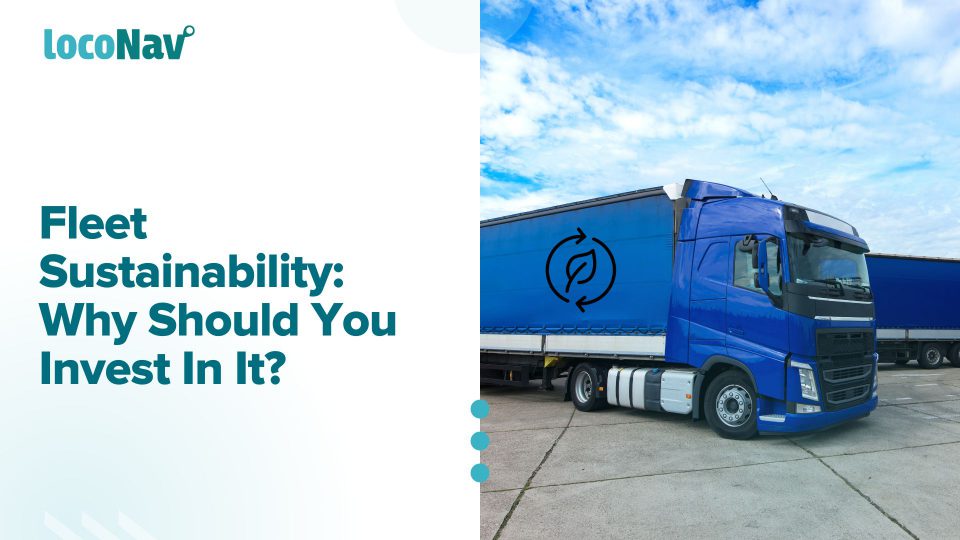

With rising fuel costs, a boom in corporate fleet sustainability programmes, and growing supply chain pressure, fleets worldwide are being pressured to become more ‘sustainable.’ But what does sustainability imply in the context of fleets, and why is it becoming so important?
A sustainable fleet is more than just one that adopts ecologically beneficial or ‘green’ operations. That is simply one of three pillars of fleet sustainability: financial, ecological, and social, also known as people, planet, and profits.
These three aspects are intertwined in sustainable fleet management techniques to secure the long-term economic viability of your fleet operations while also lowering its effect on the environment and the people you hire and service.
In this blog, we will discuss fleet sustainability in-depth and explain why you should consider investing in it.
Manage your fleet efficiently with LocoNav’s Fleet Management Solutions!
What is Fleet Sustainability?
There is no button that will instantaneously turn a fleet sustainable. It is instead about actively participating in the process of seeking improvements and efficiencies. First, you must investigate the costs and consequences of your present fleet policies. To understand these policies, data must be gathered which should ideally be as precise as per vehicle data.
Then it is a matter of constantly improving fleet operations, eliminating inefficient procedures, instituting driver training and engagement, and selecting the appropriate initiatives that will result in financial and ecological savings. A sustainable fleet is one that implements a feasible improvement strategy and, as a result, decreases its environmental and social impacts while remaining financially viable.
5 Tips for Increasing Fleet Sustainability
- Rightsize Your Fleet
Right-sizing a fleet of vehicles has several advantages, including cheaper fuel and maintenance costs, decreased greenhouse gas emissions, and a lower capital investment in vehicles. To rightsize your fleet, you must determine the utilization and condition of each vehicle.
Calculating a vehicle’s utilisation is much easier than it used to be. For example, using customised fleet reports, such as those offered by LocoNav, it is simple to discover which vehicles are being used the most and least.
To determine the condition of your vehicles, you need to evaluate vehicle health and how frequently they are used and serviced. This is easily achievable using LocoNav’s Vehicle Scorecards.
- Optimize Your Routes
With route optimization, your vehicle is presented with an efficient route at the start of the trip. Following an optimized route allows you to save time, and hence increase trip frequency which means fewer vehicles on the road, as well as decreased empty miles. Both of these allow for greater fleet sustainability because they significantly reduce greenhouse gas emissions.
With LocoNav’s Route Optimization, you can reduce fuel consumption, decrease maintenance costs, and significantly promote safer driving.
- Put A Stop To Fleet Idling
Idling produces a large carbon footprint. Idling emissions contribute to global warming and have a deteriorative impact on air quality, causing health risks to everyone. With LocoNav’s idling alerts you can:
- Get notified whenever your vehicle is idling, allowing you to decrease fuel consumption and thereby emissions.
- Extend engine life and decrease vehicle breakdowns which will reduce your carbon footprint.
- Monitor Your Fuel Consumption
This is an obvious one. Employing a fuel monitoring system can significantly affect your fleet’s sustainability. LocoNav’s fuel monitoring system will monitor fuel consumption and highlight strategies you can employ to reduce it. It will also alert you to all refuelling and pilferage incidents.
- Invest in a Telematics Solution
This is a blanket solution for your fleet sustainability efforts. A telematics solution such as LocoNav will provide you with many actionable insights to make your fleet sustainable. It will:
- Allow you to schedule regular maintenance for your fleet. This will mean fewer breakdowns, better performing vehicles that use optimal fuel and require replacement less often.
- Provide live alerts, which can help you identify sources of wastage and take remedial actions quickly.
- Provide you optimized routes, the efficacy of which we have discussed above.
- Help you identify points where you can automate your operations to eliminate human errors which can contribute to a higher carbon footprint.
What are the Impacts of Sustainable Fleet Policy on
Let us now discuss how fleet sustainability positively affects the following:
Environment
- Reduce your fleet’s fuel use to reduce its demand for fossil fuels.
- Transitioning to zero-emission vehicles
- Improve vehicle and routing efficiency to reduce greenhouse gas emissions (GHGs)
- Reduce traffic congestion by cutting back on unnecessary empty miles.
Economy
- Reduce the cost of ownership, which includes gasoline, maintenance, accident, and insurance costs, as well as other operating expenses.
- Reduce fleet capital expenditure by improving vehicle uptime and utilisation.
Society
- Fleet sustainability ensures your drivers and the public at large are not put at risk by your transportation operations.
- Reduce harmful gas and particle emissions into the atmosphere, which have been linked to respiratory ailments and early death.
- Provide your drivers with opportunities for continuing development and training so that they can attain their full potential and grow with your company.
